 W
WYakov Saulovich Agranov was the first chief of Soviet Main Directorate of State Security and a deputy of NKVD chief Genrikh Yagoda. He is known as one of main organizers of Soviet political repressions and Stalinist show trials in 1920s and 1930s. He fabricated the "Tagantsev conspiracy" case and Moscow trials, including Trial of the Twenty One and Industrial Party Trial, as well as mass arrests and executions in Saint Petersburg during Stalin's Great Purge.
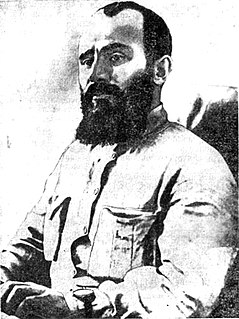 W
WGeorgiy Aleksandrovich Atarbekov, born Atarbekyan was an Armenian Bolshevik and Soviet security police official.
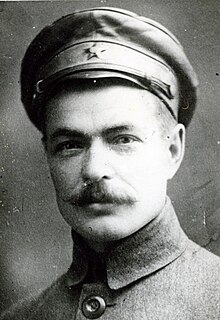 W
WIvan Petrovich Bakayev was a Russian Bolshevik revolutionary, Soviet politician and statesman. A member of the Left Opposition, he was a defendant at the first Moscow show trials.
 W
WVsevolod Apollonovych Balytsky was a Soviet official, Commissar of State Security 1st Class of the NKVD and a member of the Central Committee of the Communist Party of the Soviet Union.
 W
WMatvei Davidovich Berman was a Soviet security officer and head of the Gulag Soviet prison camp system from 1932 to 1937.
 W
WEduard Petrovich Berzin was a Soviet soldier and Chekist that set up Dalstroy, which instituted a system of forced-labour camps in Kolyma, North-Eastern Siberia, the most brutal Gulag region, where hundreds of thousands of prisoners died.
 W
WYan (Ian) Karlovich Berzin, was a Latvian Soviet communist politician and military intelligence officer.
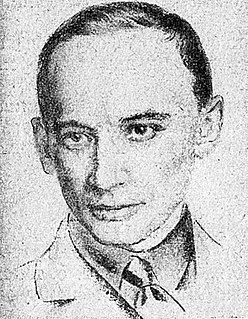 W
WGleb Ivanovich Bokii was a Ukrainian Communist political activist, revolutionary, and paranormal investigator in the Russian Empire. Following the October Revolution of 1917, Bokii became a leading member of the Cheka, the first Soviet secret police, and later of the OGPU and NKVD.
 W
WTerenty Dmitrievich Deribas was a Russian revolutionary, Chekist and later a 1st rank State Security Commissioner in the NKVD.
 W
WFelix Edmundovich Dzerzhinsky, nicknamed "Iron Felix", was a Bolshevik revolutionary and official. Born into Polish nobility, from 1917 until his death in 1926 Dzerzhinsky led the first two Soviet state-security organizations, the Cheka and the OGPU, establishing a secret police for the post-revolutionary Soviet regime. He was one of the architects of the Red Terror and decossackization.
 W
WMikhail Petrovich Frinovsky served as a deputy head of the NKVD in the years of the Great Purge and, along with Nikolai Yezhov, was responsible for setting in motion the Great Purge.
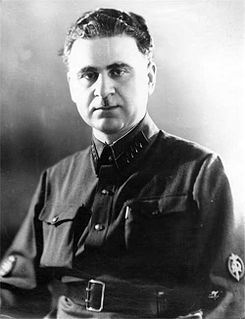 W
WSergo Arseni Goglidze was a Soviet security officer, NKVD official and Colonel General of State Security.
 W
WIzrail Moiseyevich Leplevsky was a Soviet security officer. He was part of the Intelligence Service and Secret police apparatus in the Ukrainian Soviet Socialist Republic, then People's Commissar of Internal Affairs of the Ukrainian SSR from June 14, 1937 to January 25, 1938. His brother Gregory Leplevsky also worked in senior positions in the Soviet Union, including as Prosecutor of the USSR.
 W
WMikhail Sergeyevich Kedrov was a Russian Soviet communist politician, an Old Bolshevik revolutionary, secret policeman and head of the military section of the Cheka.
 W
WNikolai Pavlovich Komarov was a Russian Soviet politician, statesman and Communist Party official.
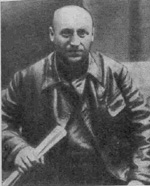 W
WIvan Ksenofontovich Ksenofontov was a Bolshevik revolutionary and one of the founding fathers and leaders of the Soviet secret police and state security agency, the Cheka. He gained notoriety as Chairman of the Supreme Revolutionary Tribunal and later as First Deputy Chairman of the Cheka, the agency's "number two" under Felix Dzerzhinsky, where he played a decisive role in crushing various anti-Bolshevik factions and the Kronstadt uprising; an early supporter of Joseph Stalin, he was described as Stalin's "mole" in the security services.
 W
WKārlis Landers was a Latvian Bolshevik revolutionary, Soviet statesman, official of the Soviet state security of the Cheka and OGPU, as well as an historian and journalist.
Martin Ivanovich Latsis was a Soviet politician, Bolshevik revolutionary and state security high officer of the Cheka from Courland.
 W
WFyodor Nikolaevich Lukoyanov (1894—1947) was a Bolshevik revolutionary, journalist, editor, and security officer.
 W
WGenrikh Samoilovich Lyushkov was an officer in the Soviet secret police and its highest-ranking defector. A high-ranking officer of the NKVD, he played a role in perpetrating Stalin's Great Purge. When, in 1938, he suspected he would soon fall victim to the purge, he fled to the Japanese. Thereafter, he acted as a major source of intelligence for Imperial Japan about the Soviet Union. At the end of World War II, he was killed by the Japanese in order to prevent him from falling back into Soviet hands.
 W
WVyacheslav Rudolfovich Menzhinsky was a Polish-Russian Bolshevik revolutionary, Soviet statesman and Party official who served as chairman of the OGPU from 1926 to 1934. He was fluent in more than 10 languages.
 W
WJēkabs Peterss was a Latvian Communist revolutionary who played a part in the establishment of the Soviet Union. Together with Felix Dzerzhinsky, he was one of the founders and chiefs of the Cheka, the secret police of the Soviet Russia. He was the Deputy Chairman of the Cheka from 1918 and briefly the acting Chairman of the Cheka from 7 July to 22 August 1918.
 W
WTeodors Eihmans was a Latvian Soviet security officer and first head of the Gulag.
 W
WJózef Unszlicht or Iosif Stanislavovich Unshlikht was a Polish and Soviet revolutionary activist, a Soviet government official and one of the founders of the Cheka.
 W
WMoisei Solomonovich Uritsky was a Bolshevik revolutionary leader in Russia. After the October Revolution, he was Chief of Cheka of the Petrograd Soviet. Uritsky was assassinated by Leonid Kannegisser, a military cadet, who was executed shortly afterwards.
 W
WGenrikh Grigoryevich Yagoda was a Soviet secret police official who served as director of the NKVD, the Soviet Union's security and intelligence agency, from 1934 to 1936. Appointed by Joseph Stalin, Yagoda supervised arrests, show trials, and executions of the Old Bolsheviks Lev Kamenev and Grigory Zinoviev, climactic events of the Great Purge. Yagoda also supervised construction of the White Sea–Baltic Canal with Naftaly Frenkel, using slave labor from the GULAG system, during which 12,000–25,000 laborers died.
 W
WLeonid Mikhailovich Zakovsky was a Latvian Bolshevik revolutionary, Soviet politician and NKVD Commissar 1st Class of State Security.
Ivan Vasilevich Zaporozhets was a Ukrainian Soviet security officer and official of the OGPU-NKVD who was suspected of being involved in the assassination of Sergei Kirov in Leningrad in December 1934.